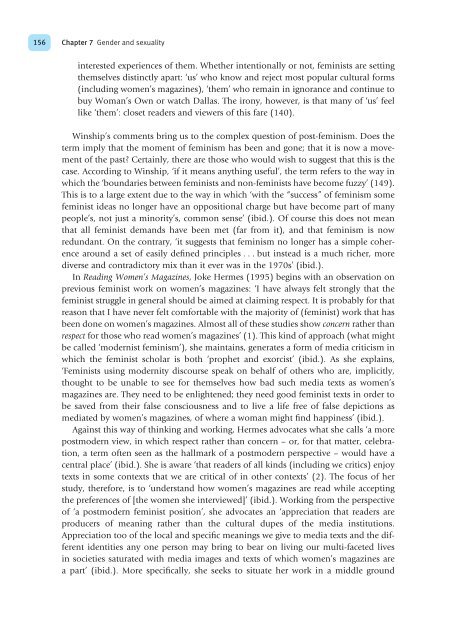Cultural Theory and Popular Culture
Cultural Theory and Popular Culture
Cultural Theory and Popular Culture
Create successful ePaper yourself
Turn your PDF publications into a flip-book with our unique Google optimized e-Paper software.
156<br />
Chapter 7 Gender <strong>and</strong> sexuality<br />
interested experiences of them. Whether intentionally or not, feminists are setting<br />
themselves distinctly apart: ‘us’ who know <strong>and</strong> reject most popular cultural forms<br />
(including women’s magazines), ‘them’ who remain in ignorance <strong>and</strong> continue to<br />
buy Woman’s Own or watch Dallas. The irony, however, is that many of ‘us’ feel<br />
like ‘them’: closet readers <strong>and</strong> viewers of this fare (140).<br />
Winship’s comments bring us to the complex question of post-feminism. Does the<br />
term imply that the moment of feminism has been <strong>and</strong> gone; that it is now a movement<br />
of the past? Certainly, there are those who would wish to suggest that this is the<br />
case. According to Winship, ‘if it means anything useful’, the term refers to the way in<br />
which the ‘boundaries between feminists <strong>and</strong> non-feminists have become fuzzy’ (149).<br />
This is to a large extent due to the way in which ‘with the “success” of feminism some<br />
feminist ideas no longer have an oppositional charge but have become part of many<br />
people’s, not just a minority’s, common sense’ (ibid.). Of course this does not mean<br />
that all feminist dem<strong>and</strong>s have been met (far from it), <strong>and</strong> that feminism is now<br />
redundant. On the contrary, ‘it suggests that feminism no longer has a simple coherence<br />
around a set of easily defined principles . . . but instead is a much richer, more<br />
diverse <strong>and</strong> contradictory mix than it ever was in the 1970s’ (ibid.).<br />
In Reading Women’s Magazines, Joke Hermes (1995) begins with an observation on<br />
previous feminist work on women’s magazines: ‘I have always felt strongly that the<br />
feminist struggle in general should be aimed at claiming respect. It is probably for that<br />
reason that I have never felt comfortable with the majority of (feminist) work that has<br />
been done on women’s magazines. Almost all of these studies show concern rather than<br />
respect for those who read women’s magazines’ (1). This kind of approach (what might<br />
be called ‘modernist feminism’), she maintains, generates a form of media criticism in<br />
which the feminist scholar is both ‘prophet <strong>and</strong> exorcist’ (ibid.). As she explains,<br />
‘Feminists using modernity discourse speak on behalf of others who are, implicitly,<br />
thought to be unable to see for themselves how bad such media texts as women’s<br />
magazines are. They need to be enlightened; they need good feminist texts in order to<br />
be saved from their false consciousness <strong>and</strong> to live a life free of false depictions as<br />
mediated by women’s magazines, of where a woman might find happiness’ (ibid.).<br />
Against this way of thinking <strong>and</strong> working, Hermes advocates what she calls ‘a more<br />
postmodern view, in which respect rather than concern – or, for that matter, celebration,<br />
a term often seen as the hallmark of a postmodern perspective – would have a<br />
central place’ (ibid.). She is aware ‘that readers of all kinds (including we critics) enjoy<br />
texts in some contexts that we are critical of in other contexts’ (2). The focus of her<br />
study, therefore, is to ‘underst<strong>and</strong> how women’s magazines are read while accepting<br />
the preferences of [the women she interviewed]’ (ibid.). Working from the perspective<br />
of ‘a postmodern feminist position’, she advocates an ‘appreciation that readers are<br />
producers of meaning rather than the cultural dupes of the media institutions.<br />
Appreciation too of the local <strong>and</strong> specific meanings we give to media texts <strong>and</strong> the different<br />
identities any one person may bring to bear on living our multi-faceted lives<br />
in societies saturated with media images <strong>and</strong> texts of which women’s magazines are<br />
a part’ (ibid.). More specifically, she seeks to situate her work in a middle ground
















